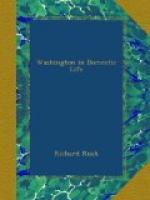GENTLEMEN:—
In confiding to your house the publication of this brief paper on some points in the character of Washington, I beg leave to say, that for any deficiency in the cost of publishing, after all your charges in having it fitly done are defrayed, I will be responsible.
And in the very remote probability of the sale of a production so limited as this, in the face of a thousand better things on Washington’s character already before the world, ever yielding anything in the way of profit after your proper expenditures are all satisfied, it will go, however small, to the Washington Monument Fund, existing in the metropolis of our country.
I am, gentlemen,
Your very faithful
And obedient servant,
RichardRush.
SYDENHAM, near Philadelphia, February 28, 1857.
To Messrs.
J.B. Lippincott and co.,
Publishers,
Philadelphia.
TO
Charles J. Ingersoll.
* * * * *
This literary trifle is hardly worth a dedication; yet it has dared to touch, though with incompetent hands, a high subject, and, trifle as it is, I dedicate it to you. At an agreeable little dinner at your table lately, where we had the new Vice-President, Mr. Breckenridge, whose maternal stock, the Stanhope Smiths and Witherspoons, so rich in intellect, we knew at Princeton, you said we had been friends for upwards of sixty years. You were right, for we were merry boys together in Philadelphia before our college days at Princeton; and I may here add, that our friendship never has been interrupted.
Richard Rush.
INTRODUCTORY EXPLANATION.
The manuscript or paper here published was prepared from a collection of original letters from General Washington on matters, for the most part, purely domestic and personal, addressed to Colonel Tobias Lear, his private Secretary for a part of the time he was President; and then, and during periods much longer, his confidential friend. They came into my hands through the voluntary kindness of Mrs. Lear, of the city of Washington, the estimable relict of Colonel Lear, and niece of Mrs. Washington, whose friendship it was my good lot and that of my family to enjoy; as we did that of Colonel Lear while he lived. The latter died in Washington in 1816. Mrs. Lear first informed me of these letters ten or twelve years ago when in Washington, and offered them to my perusal and examination, telling me to take them home and retain them as long as I chose, and use them as I thought best, for she knew I would not abuse this privilege. I brought them home as requested, being then too much engaged in the business of the Smithsonian Institution as one of the Regents on its first organization, to examine them while in Washington. She afterwards read, approved, and for some time had in her hands the paper I drew up from them.




